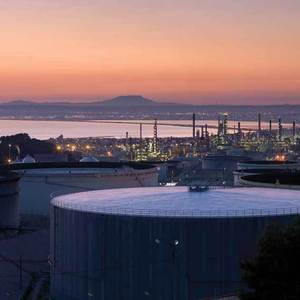Despite palm oil polemic, Total's La Mède plant to start soon

Photo: Total S.A.
June 1, 2018
BY Ron Kotrba
Amid controversy over its planned use of imported palm oil, Total S.A. received an operating license in mid-May for its La Mède biorefinery in the south of France. In 2015 the French oil giant began plans to convert its crude refinery in La Mède to produce 500,000 tons per year (approximately 170 MMgy) of renewable diesel via Axens’ Vegan process technology from as much as 650,000 tons of feedstock. Total expects to start production this summer. The conversion project is estimated at 275 million euros.
“La Mède is authorized to use up to 450,000 tons of raw vegetable oil for its feedstock supply,” Total stated. “Total has noted the controversy stirred up by erroneous reports that crude palm oil could account for as much as 450,000 tons a year, or nearly 70 percent, of the site’s feedstock. The conflation between vegetable oil and palm oil prompted the group to spell out in more detail the supply plan, worked out with the French Ministry for Ecological and Inclusive Transition that it has committed to follow.”
Total says its feedstock supply mix will consist of 60 to 70 percent raw vegetable oil from palm, rapeseed, sunflower, carinata and soybean oils, as well as distillers corn oil. The other 30 to 40 percent of the converted refinery’s feedstock will come from animal fat, used cooking oil and residues from waste or the pulp and paper industry. “That share is expected to grow over the years based on the availability of such alternative resources,” Total stated.
Advertisement
Advertisement
The company said it will “pursue a continuous improvement process” following constructive discussions with the French Ministry for Ecological and Inclusive Transition, pledging to restrict crude palm oil to less than half of the feedstock to be processed at La Mède—or no more than 300,000 tons per year.
“This commitment could not have been made without the work done to develop and promote the use of products from the circular economy, in particular by recycling animal fat,” Total stated. “Animal fat could comprise 100,000 tons per year or more of the site’s feedstock, higher than planned when the project first began. This demonstrates Total’s sensitivity to concerns about deforestation.”
Last year the EU took measures to ban palm oil for energetic uses.
France’s Federation of Oilseed and Protein Producers (FOP), strongly opposed to Total’s planned use of palm oil instead of nationally grown rapeseed oil, stated that Nicolas Hulot, France’s Minister for Ecological and Inclusive Transition, capitulated by “validating the choice of deforestation imported from palm oil; by opening the valves of used oils, waste mainly imported from Asia and largely derived from palm oil; by sacrificing French rapeseed, a local raw material and traced for the production of biofuels ‘Made in France;’ by remaining deaf to the civil society which for 71 percent is strictly opposed to the use of palm oil in fuels (poll Odoxa, April 2018); by telling the EU member states that France has made its choice—it will continue to import palm oil in defiance of the Paris Agreement and global warming; by choosing the GMO protein imported to feed the French farms, in total contradiction with the commitments of the president of the republic.”
Advertisement
Advertisement
Total stated it has committed to advocating for a “high-quality sustainable certification system” for the EU, such as the International Sustainability & Carbon Certification, or any other equivalent certification recognized by the European Commission.
“To that end,” the company stated, “a dedicated team has been set up to oversee compliance with sustainability criteria across the entire supply chain, making sure in particular that supplies are purchased from Roundtable on Sustainable Palm Oil-certified producers.”
Of Total’s receipt of an operating license and planned use of palm oil, Arnaud Rousseau, president of FOP, said, “This decision is incomprehensible. In addition to its ecological nonsense, it is a slap against our sector. It marks a break, a renunciation of the agricultural ambition carried by the government. Farmers do not deserve such contempt.”
On May 31, France’s largest farmers’ union, Fédération nationale des syndicats d'exploitants agricoles, called on farmers and consumers to block strategic sites beginning June 10 to protest the “profound injustice” of the matter.
Related Stories
The USDA significantly increased its estimate for 2025-’26 soybean oil use in biofuel production in its latest World Agricultural Supply and Demand Estimates report, released July 11. The outlook for soybean production was revised down.
U.S. fuel ethanol capacity fell slightly in April, while biodiesel and renewable diesel capacity held steady, according to data released by the U.S. EIA on June 30. Feedstock consumption was down when compared to the previous month.
The U.S. EPA on July 8 hosted virtual public hearing to gather input on the agency’s recently released proposed rule to set 2026 and 2027 RFS RVOs. Members of the biofuel industry were among those to offer testimony during the event.
The USDA’s Risk Management Agency is implementing multiple changes to the Camelina pilot insurance program for the 2026 and succeeding crop years. The changes will expand coverage options and provide greater flexibility for producers.
The USDA’s National Agricultural Statistics Service on June 30 released its annual Acreage report, estimating that 83.4 million acres of soybeans have been planted in the U.S. this year, down 4% when compared to 2024.
Upcoming Events










